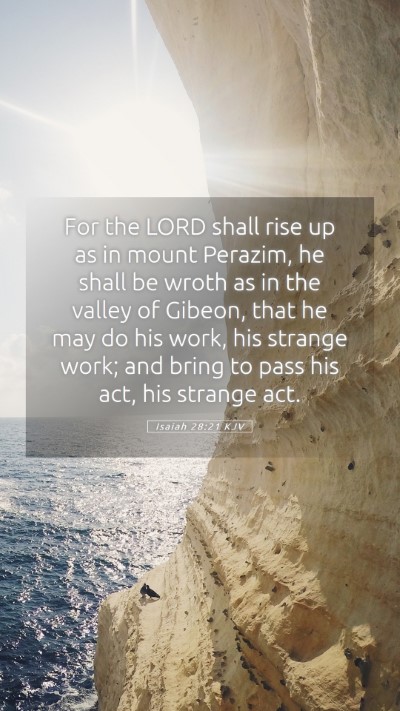Understanding Isaiah 28:21
Isaiah 28:21 states: "For the Lord shall rise up as in mount Perazim, he shall be wroth as in the valley of Gibeon, that he may do his work, his strange work; and bring to pass his act, his strange act."
Bible Verse Commentary
This verse carries a profound meaning that connects God's actions in historical contexts to future spiritual lessons. Below, we break down the interpretation and significance of this verse using insights from renowned public domain commentaries.
Insights from Matthew Henry
Henry emphasizes that this scripture highlights God's sovereign power and the often unexpected nature of His works. The reference to Mount Perazim recalls a place of victory for David, symbolizing God’s capacity to deliver unexpectedly. Henry notes that God's "strange work" refers to His surprising judgments and the unusual methods He employs to achieve divine purposes.
Insights from Albert Barnes
Barnes focuses on the historical context of the verse, linking it to God's interventions in the past, such as the battle at Gibeon. He explains that God often operates in ways that confound human wisdom, and this 'strange work' can be seen in God's dealings with nations and individuals alike. Barnes suggests that such actions serve to remind believers of God’s ultimate control over historical events.
Insights from Adam Clarke
Clarke elaborates on the metaphorical significance of the verse, indicating that God's rising up signifies a moment of divine action that disrupts the status quo. He interprets the term 'strange work' as a reference to God’s judgments that may seem perplexing or unexpected, yet are always purposeful. Clarke suggests that this serves as a warning and a call to repentance, illustrating the importance of acknowledging God’s authority and justice.
Key Themes and Meanings
- God's Sovereignty: The depiction of God rising as in a past victory illustrates His consistent engagement in human affairs.
- Unexpected Intervention: The strange work suggests that God's actions can surpass human understanding and expectations.
- Historical Reflection: The references to historical events signal how past occurrences reveal God’s character and intentions.
- Call to Recognition: Remembering God’s works encourages believers to reflect on His might and to remain receptive to His guidance.
Application of Isaiah 28:21 in Daily Life
Understanding this verse is vital not only for biblical knowledge but also for practical application in one’s spiritual journey. Here are some insights on applying its meanings:
- Recognize God's active presence in your life, especially during challenging times.
- Trust in God's plan even when it appears mysterious or beyond comprehension.
- Reflect on historical scriptures to gain insight into God's consistent character.
- Encourage others in Bible study groups to explore the unexpected ways God works.
Cross References
To further understand the significance of Isaiah 28:21, consider these related verses:
- 2 Samuel 5:20 - God's victory for David at Baal-perazim.
- Joshua 10:12-14 - The miraculous events at Gibeon.
- Isaiah 29:14 - God's wisdom surpassing human understanding.
Conclusion
This examination of Isaiah 28:21 reveals the depth of God’s mysterious workings and the encouragement for believers to be aware of His profound influence in history and their personal lives. Through the study of this verse, individuals can develop a richer understanding of Scripture and its implications for their faith.


